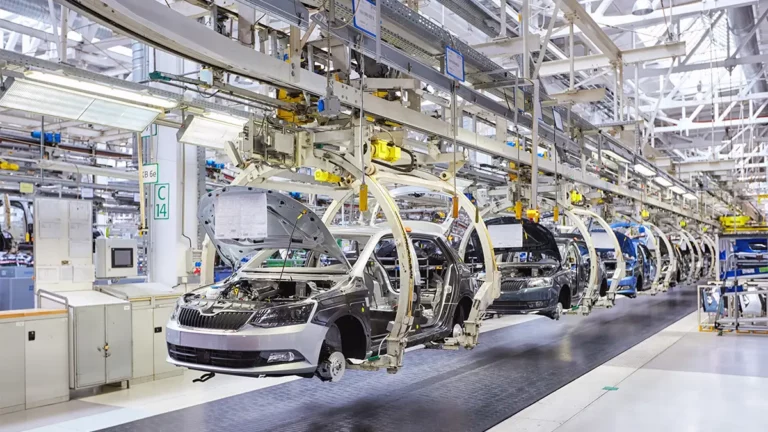The world is developing rapidly and coupled with increasing globalization has uncovered previously unconsidered needs and desires of automotive consumers. As it is seen that the country’s digital revolution is accelerating, a world of opportunities is also opening in the global automotive sector which is paving the way for the future of the automotive industry, however, we can see that the traditional business model of designing, manufacturing, selling, service, and financing of vehicles continues.
I am sure you all at some point have been fascinated by the high-tech automotive facilities we all have today. This is all because the automotive industry is heading towards a new world that is driven by sustainability, and changing consumer behaviour, encompassing electric vehicles, connected cars, mobility fleet sharing, onboard sensors, new business models, and always-on connectedness. The future of the automotive industry is looking bright with the way it is functioning currently and the predictions that can be made based on the current situation. I know you all are excited to know more about the future of the automotive industry. So, keep reading folks!
Challenges Faced by The Global Automotive:
The future of the automotive industry looks bright, but there are also some challenges that the global automotive sector is continuing to face. Some of these challenges are:
-
Learning from Continuous Disruption:
During the initial lockdown of the pandemic, the automotive industry was hit hard, and as global supply chains ground to a halt, manufacturers and dealers were temporarily closed. Despite this initial lockdown, the automotive industry says that the pandemic accelerated the progress of digitization in the automotive sector.
This is not the first time that any disruption has caused inconvenience to the automotive sector, this disruption indeed made a negative impact on global auto sales but the automotive industry particularly suppliers learned a lot from the economic hardships of the past.
Overall, the continuous disruption caused by operations and supply chains has dramatically accelerated several underlying businesses and technological trends in the automotive industry. This makes even a good reason for the future of the automotive industry to be bright.
-
Disrupts and Disruptions:
The availability and the practice of adoption of advanced technology solutions are driving the majority of the underlying trends in the automotive industry. Sensors, connected cars, electrification, and new business models are all taking the advantage of advanced technology solutions. That is where the industry experts say that the auto industry needs to focus on the future of the automotive industry.
The entire industry including the suppliers and automakers is challenged to keep the existing operations profitable, while also simultaneously building out the capacity to tackle these innovations.
Companies must find the right balance between the continuity of stable and profitable business, while simultaneously leading the way in disrupting their business models.
The Solution to The Challenges Faced by The Automotive Industry:
While many of the Automakers and suppliers in the automotive industry have learned from the past to help them survive the recent disruptions and make their existing operations more efficient, some of the industry leaders say that innovation and flexibility will be critical in terms of unique challenges faced in the way of the future of the automotive industry.
As Joachim Skarpil, Head of Automotive Suppliers at Capgemini explained, “The future innovations will be achieved by software components, and each automotive supplier needs to find its answers. So, new products or other products with new services and new business models need to be developed. In the future, automotive suppliers will have to be more flexible and even faster than ever before.”
I know folks, you must be eager to know about some of the examples that can prove that the future of the automotive industry is bright. Well, without any further delay let’s get to know some of these examples:
The Future of The Automotive Industry:
-
Autonomous Vehicles:
As discussed earlier, the challenges faced by the automotive industry are just some learning lessons, as this industry bounces back with every disruption that comes on its way. Autonomous vehicles are one of the key elements to prove that the future of the automotive industry is something to look forward to. These vehicles minimize the need for human drivers and they look poised to transform everyday transportation.
The plans for autonomous vehicles to come into the picture have been in the works for several years, and leading firms have hopes that they can reduce downtime, cut traffic, and make transportation substantially safer. Autonomous vehicles are equipped with innovative recognition technologies that are capable of identifying objects on the road and avoiding a collision.
While some Autonomous vehicles have been exploring the capabilities of self-driving cars for the past few years, their usage in wider prospects is still far. However, it is seen that the first step towards this ground-breaking project is implemented in the form of hand-free parking which has the capabilities of autonomous vehicles.
-
Connected Cars:
In every industry, technology is evolving at a rapid pace and thanks to the internet, it has changed the way people communicate and go about their lives. The automotive industry in that aspect is no different as connected cars have become the latest trend that is set to spread throughout the globe.
A connected car has its connection to the internet allowing the car to share internet access and data with other devices inside and outside the car. With the demand for more excellent connectivity set to soar, 5G-enabled connected cars are set to become the future of the automotive industry.
There are many benefits of connected cars which are:
- You will get the benefit of high-tech navigation systems through third-party apps.
- Enhanced security features will help you to keep a track of your vehicle when you are not driving the car.
- You can get the benefit of accessing a variety of entertainment services on the go.
- There are fewer chances of an accident due to advanced safety features and you will be able to preserve your health in case of a crash.
- Production of Electric Vehicles:
Electric vehicles are not particularly a new trend in the automotive industry, but they are the future of the automotive industry. They are rapidly becoming a popular choice of cars across the globe and Global auto sales in Electric vehicles will record high in the year 2021.
The acceleration of the electric vehicle and hybrid vehicle market is driven by the urgent need of meeting global sustainability. The major benefit that EVs possess is their contribution toward improving air quality in towns and cities, they also reduce the use of fossil fuels. The EVs are designed in such a way that they do not produce carbon dioxide, hence there is no carbon emission from EVs. This considerably reduces air pollution.
With the rise in climate fears, the US Government is pushing forward with the 2030 Net-Zero plans, from what is seen, the use of EVs will become more affordable and widespread soon. Thus, this is a solid development that is paving the way for the future of the automotive industry.
-
Sustainable Manufacturing Operations:
As the importance of addressing environmental issues is growing, sustainability has become a hot topic across all industries, especially in the automotive industry. With the focus to improve sustainability, vehicle manufacturing firms must take into consideration the idea of installing operations that incorporate weight reductions, innovative sustainable materials, recycled materials, and new production methods.
The current trend such as zero-emission vehicles and carbon-neutral manufacturing, demonstrate the growing significance of the automotive industry and shows that sustainability has improved throughout the industry over the past decade.
The future of the automotive industry is approaching sooner than we are expecting. This is because we are beginning to lean towards a net-zero world. Sustainable manufacturing operations are all set to become a key feature in the future of the automotive industry.
-
Changing Customer Demands:
With the growing trends in the automotive industry, automotive companies need to innovate and develop solutions quickly to react fast to the changing customer demands and market opportunities.
In a digital world, innovation is the key that would drive a brighter future for the automotive industry and innovation must become an integral part of each department and discipline so that the entire enterprise plays a role in contributing to generating top-line, bottom-line, and green-line improvements.
Strategies for Success:
To implement a brighter future of the automotive industry, there are certain strategies that the automotive sector must engage with. Automotive industries are using to balance the need to run a profitable business while the developing and disruptive solutions and business models include:
-
Mobility Services:
Customer loyalty will move from brand and dealerships to integrated and convenience-driven services and associated mobility options. New business models of pay-per-use and subscription-based mobility will be the strategy to move forward.
-
Customer Centricity:
Throughout the pandemic, it is seen that many car dealers and manufacturers have discovered new ways to have customer interaction and they are planning to expand this.
Digital Supply Chain and Smart Manufacturing:
Supply chains and manufacturing networks must become more resilient, completely modular and flexible.
-
Engaging with Changing Workforce:
The skills that are needed in the automotive industry are changing and companies must change the way they attract, reskill, retain and retire workers.
Conclusion:
This is all about the future of the automotive industry. Hope the article helped you in getting all the information that you needed.

















